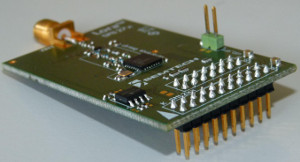Driver library for SX1272/SX1276 transceivers
Dependents: LORA_RX LORA_TX WindConcentrator hid_test ... more

Driver library for SX1272 and SX1276 radio transceivers.
This device uses CSS modulation to provide much improved link budget. The RF hardware is same as in FSK devices, just with added LoRa spread-spectrum modem.
This library provides functions to configure radio chip and transmit & receive packets.
Using This Library
Library function service_radio() must be called continuously from main loop, to service interrupts from radio.

Board Specific implementation
FunctionPointer for rf_switch callback allows the program to implement control of RF switch unique to their board.
Example options are:
- SKY13373 for external power amplifier implementation. Requires two DigitalOut pins.
- SKY13350 using PA_BOOST. requires two DigitalOut pins.
- PE4259-63: controlled directly by radio chip, no software function needed. However, in the case of SX1276MB1xAS, the RXTX pin on IO2 should be driven by this callback function when R16 is installed (without R15) on this shield board.
Some configurations may need to force the use of RFO or PA_BOOST, or a board could offer both options. The rf_switch function pointer callback should support the implementation choice on the board.
further reading
- LoRa modulation basics (dropbox PDF)
- OpenLoRa forum
sx127x.cpp
- Committer:
- dudmuck
- Date:
- 2015-02-27
- Revision:
- 10:7382c260c4b1
- Parent:
- 7:927a05f84ede
- Child:
- 24:cad6e7ce6928
File content as of revision 10:7382c260c4b1:
#include "sx127x.h"
/* SX127x driver
* Copyright (c) 2013 Semtech
*
* Licensed under the Apache License, Version 2.0 (the "License");
* you may not use this file except in compliance with the License.
* You may obtain a copy of the License at
*
* http://www.apache.org/licenses/LICENSE-2.0
*
* Unless required by applicable law or agreed to in writing, software
* distributed under the License is distributed on an "AS IS" BASIS,
* WITHOUT WARRANTIES OR CONDITIONS OF ANY KIND, either express or implied.
* See the License for the specific language governing permissions and
* limitations under the License.
*/
SX127x::SX127x(PinName mosi, PinName miso, PinName sclk, PinName cs, PinName rst, PinName dio_0, PinName dio_1) :
m_spi(mosi, miso, sclk), m_cs(cs), reset_pin(rst), dio0(dio_0), dio1(dio_1)
{
reset_pin.input();
m_cs = 1;
m_spi.format(8, 0);
m_spi.frequency(3000000);
init();
}
SX127x::~SX127x()
{
set_opmode(RF_OPMODE_SLEEP);
}
void SX127x::init()
{
type = SX_NONE;
RegOpMode.octet = read_reg(REG_OPMODE);
RegPaConfig.octet = read_reg(REG_PACONFIG);
RegLna.octet = read_reg(REG_LNA);
RegDioMapping1.octet = read_reg(REG_DIOMAPPING1);
RegDioMapping2.octet = read_reg(REG_DIOMAPPING2);
get_type();
if (type == SX1272) {
// turn on PA BOOST, eval boards are wired for this connection
RegPaConfig.bits.PaSelect = 1;
write_reg(REG_PACONFIG, RegPaConfig.octet);
}
}
void SX127x::get_type()
{
RegOpMode.octet = read_reg(REG_OPMODE);
/* SX1272 starts in FSK mode on powerup, RegOpMode bit3 will be set for BT1.0 in FSK */
if (!RegOpMode.bits.LongRangeMode) {
set_opmode(RF_OPMODE_SLEEP);
wait(0.01);
RegOpMode.bits.LongRangeMode = 1;
write_reg(REG_OPMODE, RegOpMode.octet);
wait(0.01);
RegOpMode.octet = read_reg(REG_OPMODE);
}
if (RegOpMode.sx1276LORAbits.LowFrequencyModeOn)
type = SX1276;
else {
RegOpMode.sx1276LORAbits.LowFrequencyModeOn = 1;
write_reg(REG_OPMODE, RegOpMode.octet);
RegOpMode.octet = read_reg(REG_OPMODE);
if (RegOpMode.sx1276LORAbits.LowFrequencyModeOn)
type = SX1276;
else
type = SX1272;
}
}
void
SX127x::ReadBuffer( uint8_t addr, uint8_t *buffer, uint8_t size )
{
uint8_t i;
m_cs = 0;
m_spi.write(addr); // bit7 is low for reading from radio
for( i = 0; i < size; i++ )
{
buffer[i] = m_spi.write(0x00);
}
m_cs = 1;
}
uint8_t SX127x::read_reg(uint8_t addr)
{
uint8_t ret;
// Select the device by seting chip select low
m_cs = 0;
m_spi.write(addr); // bit7 is low for reading from radio
// Send a dummy byte to receive the contents of register
ret = m_spi.write(0x00);
// Deselect the device
m_cs = 1;
return ret;
}
int16_t SX127x::read_s16(uint8_t addr)
{
int16_t ret;
// Select the device by seting chip select low
m_cs = 0;
m_spi.write(addr); // bit7 is low for reading from radio
// Send a dummy byte to receive the contents of register
ret = m_spi.write(0x00);
ret <<= 8;
ret += m_spi.write(0x00);
// Deselect the device
m_cs = 1;
return ret;
}
uint16_t SX127x::read_u16(uint8_t addr)
{
uint16_t ret;
// Select the device by seting chip select low
m_cs = 0;
m_spi.write(addr); // bit7 is low for reading from radio
// Send a dummy byte to receive the contents of register
ret = m_spi.write(0x00);
ret <<= 8;
ret += m_spi.write(0x00);
// Deselect the device
m_cs = 1;
return ret;
}
void SX127x::write_u16(uint8_t addr, uint16_t data)
{
m_cs = 0; // Select the device by seting chip select low
m_spi.write(addr | 0x80); // bit7 is high for writing to radio
m_spi.write((data >> 8) & 0xff);
m_spi.write(data & 0xff);
m_cs = 1; // Deselect the device
}
void SX127x::write_u24(uint8_t addr, uint32_t data)
{
m_cs = 0; // Select the device by seting chip select low
m_spi.write(addr | 0x80); // bit7 is high for writing to radio
m_spi.write((data >> 16) & 0xff);
m_spi.write((data >> 8) & 0xff);
m_spi.write(data & 0xff);
m_cs = 1; // Deselect the device
if (addr == REG_FRFMSB) {
if (data < 0x8340000) // < 525MHz
HF = false;
else
HF = true;
}
}
void SX127x::write_reg(uint8_t addr, uint8_t data)
{
m_cs = 0; // Select the device by seting chip select low
m_spi.write(addr | 0x80); // bit7 is high for writing to radio
m_spi.write(data);
m_cs = 1; // Deselect the device
}
void SX127x::WriteBuffer( uint8_t addr, uint8_t *buffer, uint8_t size )
{
uint8_t i;
m_cs = 0; // Select the device by seting chip select low
m_spi.write(addr | 0x80); // bit7 is high for writing to radio
for( i = 0; i < size; i++ )
{
m_spi.write(buffer[i]);
}
m_cs = 1; // Deselect the device
}
void SX127x::set_opmode(chip_mode_e mode)
{
RegOpMode.bits.Mode = mode;
// callback to control antenna switch and PaSelect (PABOOST/RFO) for TX
rf_switch.call();
write_reg(REG_OPMODE, RegOpMode.octet);
}
void SX127x::set_frf_MHz( float MHz )
{
uint32_t frf;
frf = MHz / FREQ_STEP_MHZ;
write_u24(REG_FRFMSB, frf);
if (MHz < 525)
HF = false;
else
HF = true;
}
float SX127x::get_frf_MHz(void)
{
uint32_t frf;
uint8_t lsb, mid, msb;
float MHz;
msb = read_reg(REG_FRFMSB);
mid = read_reg(REG_FRFMID);
lsb = read_reg(REG_FRFLSB);
frf = msb;
frf <<= 8;
frf += mid;
frf <<= 8;
frf += lsb;
MHz = frf * FREQ_STEP_MHZ;
if (MHz < 525)
HF = false;
else
HF = true;
return MHz;
}
void SX127x::hw_reset()
{
/* only a french-swiss design would have hi-Z deassert */
reset_pin.output();
reset_pin.write(1);
wait(0.05);
reset_pin.input();
wait(0.05);
}